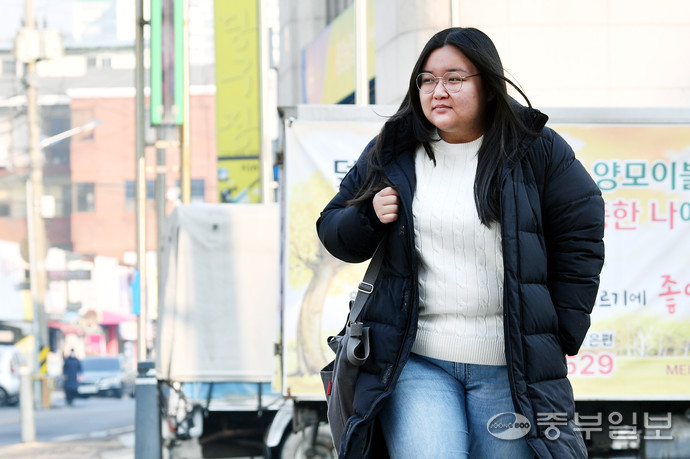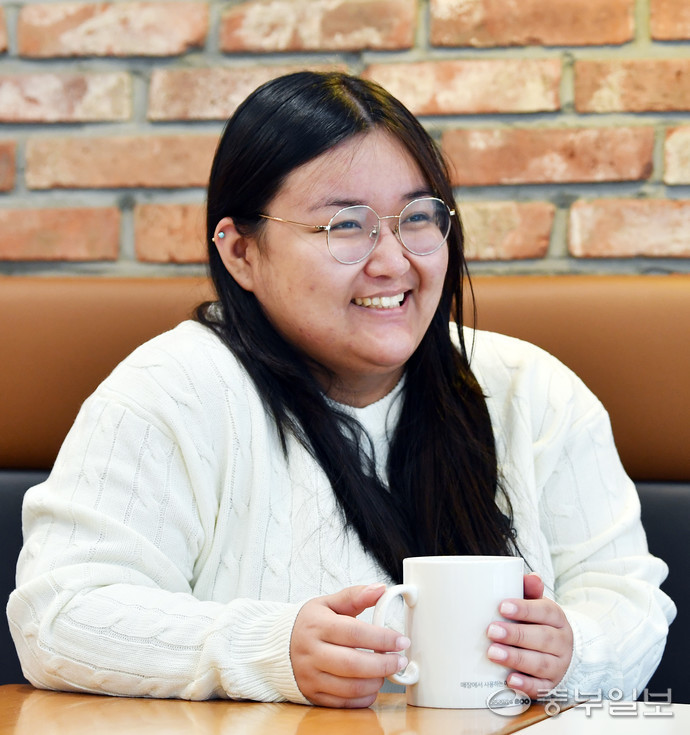This is the era of multiculturalism for 2 million people. If you look around, you can easily see neighbors with different skin colors and languages. However, Korean society's notion of multiculturalism is not keeping up with the changes of the times. To solve this problem, the Joongbooilbo has planned a ‘multi-culture story(다문화 스토리)’ that introduces multicultural neighbors living in various ways. ‘Multi-culture Story(다문화 스토리)’ aims to calmly capture the stories of multicultural people living around us and create changes in Korean society in the age of multiculturalism. -Ed-.
Christina Choi (23), a third-generation Goryeoin from Uzbekistan, did not know that her ancestors came from Korea until she came to this country. And she never expected to live in Korea where she just came to travel with her father. But now, 12 years later, Korea has become the home of her life. Currently working as an English instructor, she visits the Yongin Welfare Center for Foreigners in her spare time and volunteers to interpret and translate English and Russian. She hopes that migrant foreigners will settle down with her help as like she has grown through the support of this society. She says that she is always grateful to Korean society for giving her a fair opportunity so that she feels no discrimination. Joongbooilbo met Christina Choi, who loves Korea more than Koreans.
- How did you come to Korea?
When I was 13, my father asked me to go on a trip to Korea during summer vacation. In fact, I didn't even know that there was a country called Korea before that. Just out of my excitement, I followed my father. However, a few days after my arrival, my father said that I would go to school there. Actually, my father came to Korea with the intention of moving, not traveling. He suggested that we go on a trip because he worried my family would oppose it.
- Why did your father want to move to Korea?
My father worked in the construction industry before. However, as Uzbekistan's economic situation deteriorated, his salary was often delayed. As the head of the family, he seems to have had a great sense of responsibility to support my family. It seems that my dad decided to go to Korea, thinking that if he goes to Korea, he will be able to earn more money than in Uzbekistan and receive his salary on time.
- How did you feel when you heard that you would live in Korea?
My grandfather, grandmother, and maternal grandfather are Goryeoin but I didn't hear much about Korea when I grew up in Uzbekistan. Of course, my family made Korean food at home, but I didn't recognize it as Korean culture. So when I heard that I would be living in Korea, I was very confused. My father comforted me by saying that he would send me back to Uzbekistan if it was too difficult after going to school in Korea.
- You started living in Korea without any notice. What was the hardest part?
The new school I attended after entering Korea was Neunggok Elementary School in Goyang. At that time, the only foreign students in the school were me and my younger sister. It is said that the teachers were very embarrassed since we can't speak Korean at all.
Loneliness was also a factor that made me difficult. Due to communication-deficient and the shortage of interaction with people made me feel alone. I had asked my father to send me back to Uzbekistan. But as time passed, I started to get used to it little by little.
- Have you ever been discriminated against or bullied just because you came from a foreign country?
Fortunately, I had no such experience. Also, my appearance is similar to Koreans (laughs). On the contrary, since I was not good at Korean, my friends came to me first to help me.

- What should immigrant youths like you do to get along well with their friends?
They should try to understand Korean culture first. When I first came, there were many things that I did not understand culturally. Eating lunch in class even was strange. The food that came out was also full of things I didn't know well. I did not eat lunch at school for about a month after entering school. But if I didn't do anything, nothing would change. So I changed my mind and if there was something I didn't know, I didn't hesitate to ask my friends. Fortunately, my friends treated me kindly. If they swallow their pride a little and try to get used to Korean culture, they will naturally make friends.
- What do you do currently?
Since last week, I have been working as a teacher at an English academy. It's my first job. I am now trained in how to conduct classes and treat children. I probably participate in the class to teach from next week.
- You are from Uzbekistan, but you became an English teacher instead of a Russian.
I majored in English at Hankuk University of Foreign Studies Global Campus located in Yongin. It has been my dream to become a teacher since I was a child. However, since I am a foreigner, I am not eligible to be a public education official. So I decided to teach the children at the academy. It's only been a week, but I'm enjoying it.
- Do you have any plans to take the employment exam to be a teacher working for a public school in Korea after obtaining citizenship?
The process of acquiring Korean nationality is not simple. As a Goryeoin, it is easier than for other foreigners to get a residence visa for the first time, but there is no difference in the naturalization process. It costs a lot and the conditions are stringent. Foreigners must have an annual income of 40 million won or more, and they must also have a certain level of the property. One day I will acquire Korean citizenship, but it is difficult at this moment.

- What does Korea mean to Goryeoin?
Let me give you an example. After the war broke out between Ukraine and Russia, many Goryeoin living in Ukraine fled to Korea. For Goryeoin, Korea is a COUNTRY WHERE WE CAN LIVE AND SURVIVE. The Korean government is considering making it easy for Goryeoin to obtain residence visas. I really appreciate it.
- Although you are a Goryeoin, you are obviously a foreigner. Is there anything uncomfortable about living as a foreigner?
None at all. Korea is a country where all opportunities are open to all regardless of nationality. There is nothing we cannot do because we are foreigners. Wherever we go, we are treated the same and receive the same benefits.
- Are you going to settle down in Korea?
Yes. Someday, I will acquire Korean citizenship. If I get a passport, I want to travel freely around the world. Because there are many countries where we can go without a visa as long as we have a Korean passport.
- What are your future plans?
Live like a Korean. I really respect the way Koreans live. In fact, Uzbekistan culture is more patriarchal and conservative than that of Korea. Most of my female friends in Uzbekistan are still only 23 years old, but most of them are married. Such is the custom of society. My father has already asked me about my wedding plans.
However, Koreans seem to live in an appropriate balance between individual happiness and family and social happiness. I want to follow the lifestyle. I also want to become a person who can be a source of strength to my family and society while pursuing my own happiness.
By Seyong Lee
Photos by Kyungmin Kim
